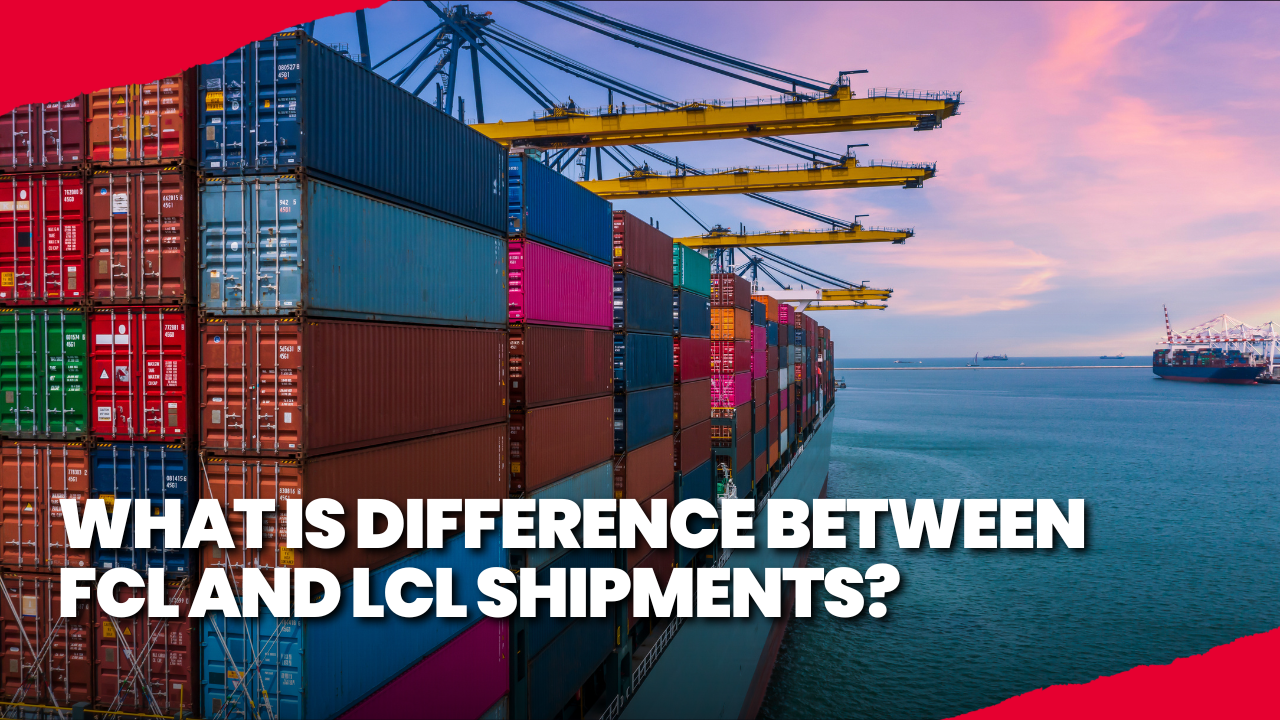
The way you select to transfer items in international shipping can directly affect how much you pay, how long it takes to get there, and how well your business runs. FCL and LCL are two prominent ways to ship containers. It’s necessary to know how these two options are different and how they affect your supply chain, whether you’re a startup importing small volumes or an exporter handling large cargo.
Here, we’ll define FCL and LCL, go over their benefits and drawbacks, and explain when to employ each. We’ll also explain what FCL and LCL stand for, which will help you make better choices about your logistics.
What is FCL in Shipping?
Full Container Load is what FCL stands for. So, even if the container isn’t completely full, one shipper still uses it to transfer merchandise. Without regard to the amount of space you utilize, you are charged for the entire container.
FCL Benefits
- FCL has a lot of benefits, one of which is that your cargo isn’t shared with others, which lowers the risk of damage or contamination.
- More efficient transportation times because other shipments are not delayed or delayed as frequently.
- Shipping more lowers per-unit expenses due to economies of scale.
- Better for things that are fragile, valuable, or sensitive to temperature.
- Businesses that ship a lot of goods, all pallets, or goods that need to get there quickly often employ FCL.
What is LCL in Shipping?
Less than Container Load is the full form of LCL. This choice is great for shippers who don’t have enough stuff to fill a whole container. When you use LCL, your cargo is placed into a shared container with shipments from other suppliers. Only the volume (CBM) that you actually use will be charged to you.
The Main Benefits of LCL
- More affordable for smaller or irregular shipments.
- Good for businesses that want to try out new markets or export small amounts of goods.
- An entire container load is not necessary.
- Very adaptable; you can send out smaller quantities more regularly.
- LCL requires more handling and may take a little longer because of the processes of consolidation and deconsolidation, but it is very helpful for small and medium-sized businesses and startups who have lean inventory systems.
FCL Full Form and LCL Full Form
FCL stands for Full Container Load. This is the ideal option for large shipments that need their own container space and faster delivery.
LCL stands for “Less than Container Load.” It’s best for smaller shipments that don’t need a full container and are on a budget.
FCL vs LCL – Major Differences
| Aspect | FCL (Full Container Load) | LCL (Less than Container Load) |
| Full Form | Full Container Load | Less than Container Load |
| Container Use | Dedicated to one shipper | Shared among multiple shippers |
| Cost Basis | Per container | Per CBM (cubic meter) |
| Delivery Time | Faster | Slightly longer |
| Risk Factor | Lower (no mixing of cargo) | Slightly higher due to various goods |
| Ideal For | Bulk shipments | Small to medium-sized shipment |
Also Read this: How to Import Goods from China to India: Complete Guide for 2025
When Should You Choose FCL?
If you have enough goods to fill or almost fill a 20ft or 40ft container, choose FCL. It’s a terrific option for large shipments where having the whole container to yourself is a plus. FCL lowers the chance of damage to your fragile, sensitive, or valuable goods by keeping them separate from other cargo.
Since consolidation and multiple handling centers are not needed, transit times are also decreased. It may seem like a lot of money upfront, but the FCL full form gives high-volume shippers better control and lower costs per unit.
When is LCL the best choice?
LCL is a better choice when your cargo is small, usually less than 15 to 18 CBM, and you don’t need to hire an entire container. It’s great for businesses that transport small amounts of goods frequently or are just getting started. LCL is a smart and flexible alternative if you want to avoid the cost and trouble of managing incredible stocks or if you’re trying out a new product or market.
The LCL complete form is really helpful for e-commerce companies, new businesses, and small manufacturers that want to grow their businesses without spending too much on shipping.
Factors to Think About
- There may be hidden costs with LCL shipments, like handling at the Container Freight Station (CFS), deconsolidation fees, and additional documentation fees. Always check the full price.
- Container availability and timely space booking are two aspects of FCL that require early preparation, particularly during high seasons.
- In either scenario, it’s a good idea to get cargo insurance to safeguard your goods against loss, damage, or delays while they’re being shipped.
When choosing between FCL and LCL, you should think about important things such as the volume of the shipment, the delivery plan, your risk tolerance, and your entire logistics strategy.
Wrapping It Up
Knowing the difference between FCL and LCL will help you pick the best way to ship for your business. The FCL is the best option for big shipments that need their own container and need to get there quickly. For less complex shipments that do not require a full container, LCL is an excellent choice.
Choose the option that works best for the size of your package, your budget, and your delivery demands. Time and money will be saved eventually.
FAQs
The FCL full form is Full Container Load. It’s ideal to use a container when you have enough things to fill it or need to use it just for that, to speed up delivery.
The LCL full form is Less than Container Load. Since you only pay for the space you actually use, it works best for smaller shipments mall and medium-sized businesses (SMEs) and startups commonly choose it.
Yes, LCL may be less expensive for small shipments. But for larger shipments, FCL might be more affordable per unit and has fewer risks when it comes to handling.
Also Checkout Our YouTube Channel: @limeinstituteofexportimport






